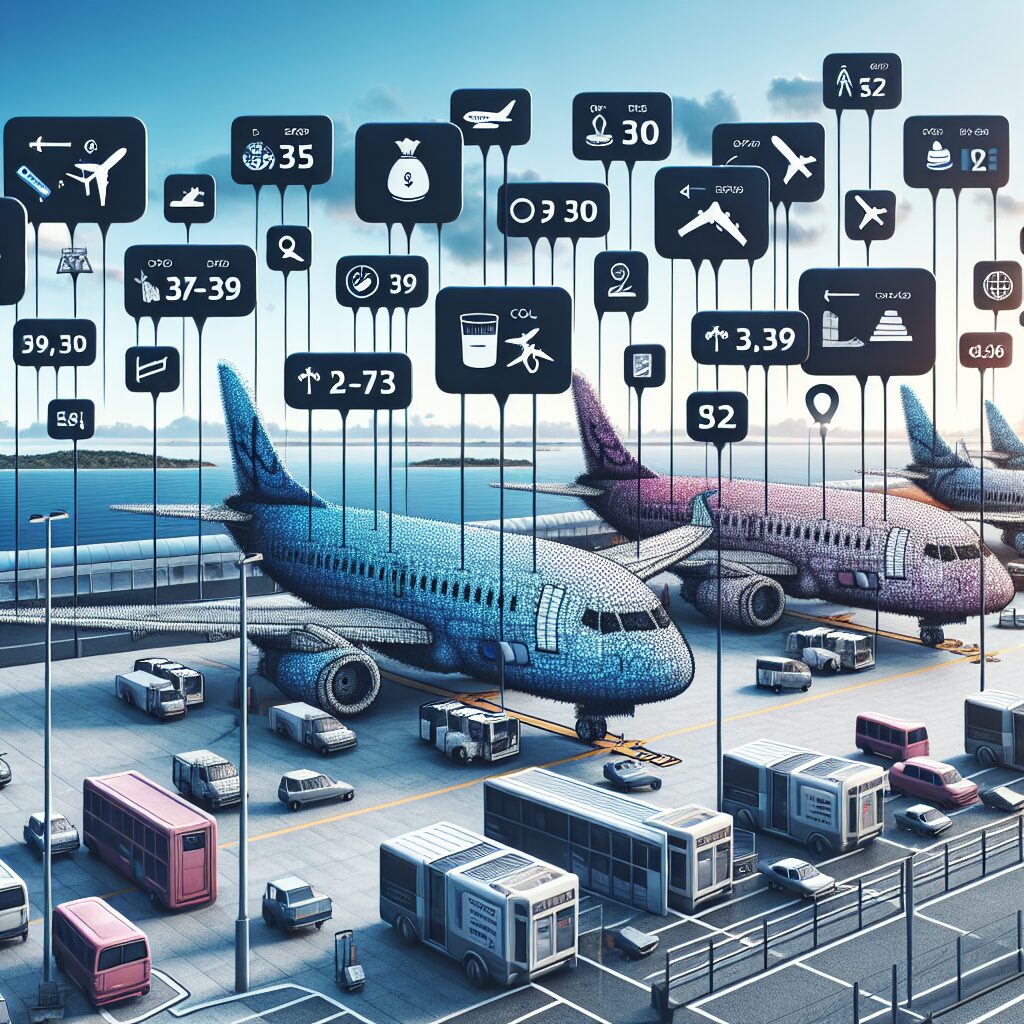Comparing Flight Deals Effectively is a crucial task for any traveler seeking to make the most of their budget and find the best possible options. In today’s fast-paced world, where numerous airlines and online travel agencies offer a multitude of deals, it can be overwhelming to navigate through the sea of options. However, with a strategic approach and some helpful tips, comparing flight deals can become a manageable and even enjoyable process.
One unique fact to consider is that flight prices can vary significantly depending on various factors such as the time of year, the day of the week, and even the time of day. For example, booking a flight during off-peak season or on a less popular day of the week can often result in substantial savings. Additionally, airlines may offer special discounts or promotions during certain periods, making it advantageous to stay informed about any upcoming sales.
Now that we have explored this fascinating aspect of flight deals, let’s delve into some key takeaways to better equip you for comparing flight deals effectively. We will discuss the importance of flexibility in travel dates, the significance of exploring multiple search engines and booking platforms, and the need to consider other expenses associated with the flight. By following these essential tips, you can be on your way to finding unbeatable flight deals and making the most of your travel adventures. So without further ado, let’s dive into the world of flight comparisons and uncover the secrets to saving money while embarking on your dream journey.
Key Takeaways
1. Compare flight deals from multiple sources: To find the best flight deals, it is essential to compare prices from various sources such as airline websites, travel search engines, and online travel agencies. This allows you to get a comprehensive view of available options and make an informed decision.
2. Utilize flexible date search tools: Many travel websites provide flexible date search tools that help you find the cheapest fares within a specified time range. By being flexible with your travel dates, you can often score significant savings on flights.
3. Consider alternate airports: While major airports are convenient, it is worth exploring flights from nearby airports as well. Smaller airports or those in neighboring cities may offer lower fares due to less demand. By considering alternate airports, you can potentially find great deals and save money.
4. Look for hidden fees and additional costs: When comparing flight deals, it is crucial to consider hidden fees and additional costs that may not be reflected in the initial price. These can include baggage fees, seat selection charges, or even fees for in-flight amenities. Accounting for these additional expenses helps you accurately compare deals and avoid any surprises.
5. Stay updated with price alerts and newsletters: Signing up for price alerts and newsletters from airlines, travel websites, and travel agencies can keep you informed about the latest flight deals. Being proactive in staying updated with such notifications can help you snag great deals as soon as they become available.
How to Compare Flight Deals Effectively?
Factors to Consider when Comparing Flight Deals
When looking for the best flight deals, there are several factors to consider that can help you make an informed decision:
1. Price
The price of the flight is often the first and most important factor for many travelers. Compare the prices offered by different airlines and travel websites to find the most affordable option.
2. Flight Schedule
Consider the departure and arrival times of the flights. Look for flights that fit your preferred travel schedule and minimize layover time if possible.
3. Airlines and Reputation
Take into account the reputation and customer reviews of the airlines offering the flight deals. Research about their safety records, in-flight services, and overall customer satisfaction to ensure a pleasant journey.
4. Baggage Policy
Check the baggage allowance and policy of each airline. Some airlines may charge extra for checked bags or have stricter weight limits, which could affect your overall travel costs.
5. Inclusions and Add-Ons
Review the inclusions and add-ons offered with the flight deals. These may include complimentary meals, Wi-Fi access, or the option to upgrade your seat, enhancing the overall value of your journey.
6. Flexibility
Consider the flexibility of the flight deals. Some airlines may allow free date changes or offer refunds in case of unforeseen circumstances, giving you peace of mind when planning your trip.
Comparison Tools and Websites
Utilizing flight comparison tools and websites can significantly simplify the process of comparing flight deals. Here are some popular platforms that can assist you:
1. Skyscanner
Skyscanner is a widely used flight search engine that compares prices across various airlines and travel websites. It offers an intuitive interface and filters to refine your search based on specific criteria.
2. Kayak
Kayak not only helps you compare flight deals but also provides insights on the best time to book flights. It offers a comprehensive overview of prices, schedules, and additional features.
3. Google Flights
Google Flights simplifies the flight comparison process with its user-friendly interface and helpful features. It allows you to explore different destinations, set price alerts, and view a calendar of the cheapest days to fly.
4. Momondo
Momondo is known for its ability to find hidden deals and offer competitive prices. It searches hundreds of websites and airlines to present you with a wide range of flight options.
Tips for Effectively Comparing Flight Deals
- Start your search early to increase the chances of finding the best flight deals.
- Be flexible with your travel dates as flying on weekdays or during off-peak seasons can result in lower prices.
- Sign up for airline newsletters and fare alerts to receive notifications about special discounts and promotions.
- Consider alternative airports or nearby cities that may have cheaper flight options.
- Read the fine print of the flight deals, especially regarding cancellation policies and change fees.
- Compare not only the upfront prices but also the overall value and convenience offered by each flight option.
- Use multiple flight comparison tools to ensure you’re getting comprehensive results and the best possible deals.
- Take advantage of frequent flyer programs and loyalty rewards to maximize your savings.
- Book directly with the airline or reputable travel websites to avoid potential scams or hidden fees.
- Consider bundling flight and hotel bookings to potentially save even more on your travel expenses.
Frequently Asked Questions
1. How can I find the best flight deals?
There are several ways to find the best flight deals. Firstly, consider using flight comparison websites to compare prices across multiple airlines. Additionally, signing up for email alerts from airlines or travel websites can notify you of any special deals or promotions. Lastly, being flexible with your travel dates and destinations can often result in finding cheaper flights.
2. Are there any specific days or times when flights are usually cheaper?
Generally, flights tend to be cheaper on Tuesdays, Wednesdays, and Saturdays compared to other days of the week. Similarly, early morning or late-night flights tend to be more affordable than peak hours. However, the best day or time to find cheap flights can vary depending on various factors like the specific route, time of the year, and demand.
3. What should I consider when comparing flight deals?
When comparing flight deals, it’s important to consider factors such as the total cost (including taxes and fees), flight duration, layovers, baggage allowances, and airline reputation. Additionally, take note of any restrictions or limitations on ticket changes or cancellations, as these can affect the overall value of the deal.
4. Should I always choose the cheapest flight?
While price is an important factor, choosing the cheapest flight isn’t always the best option. It’s essential to consider other factors like the reputation and reliability of the airline, customer reviews, and the overall value provided by the deal. Sometimes, paying a slightly higher price for better service or more convenient flight timings can be worth it.
5. Can I save money by booking a round-trip ticket instead of one-way?
Generally, booking a round-trip ticket tends to be cheaper than two separate one-way tickets. Airlines often offer discounts or special fares for round-trip bookings. However, it’s always advisable to compare the prices of both options to ensure you’re getting the best deal, especially if your travel plans are not yet confirmed.
6. Are there any additional fees or charges that I should be aware of?
Yes, it’s important to be aware of additional fees and charges when comparing flight deals. These may include baggage fees, seat selection fees, ticket change or cancellation fees, and in-flight meal charges. Make sure to read the terms and conditions of the deal carefully to understand all the potential costs involved.
7. How far in advance should I book to get the best flight deals?
Booking in advance can often result in getting better flight deals. For domestic flights, it is generally recommended to book at least 1-3 months in advance. For international flights, booking 2-8 months ahead of your planned travel dates can help you secure better prices.
8. Can I negotiate flight deals directly with the airline?
Unfortunately, negotiating flight deals directly with the airline is usually not possible. Airline prices are typically determined based on various factors like demand, competition, and availability. However, you can sometimes find exclusive deals or promo codes by subscribing to airline newsletters or following them on social media.
9. Is it better to book flights through a travel agent or directly from the airline?
There is no definitive answer to this question as it depends on personal preferences. Booking directly from the airline can sometimes offer more flexibility in terms of managing your booking, making changes, or handling flight disruptions. On the other hand, travel agents often have access to special deals, package discounts, and can assist in planning complex itineraries.
10. Are there any hidden costs associated with flight deals that I should be cautious about?
Yes, there can be hidden costs associated with flight deals that you should be cautious about. These may include surcharges for specific payment methods, extra charges for preferred seating, airport transfer fees, or additional charges for luggage exceeding the specified weight limits. Carefully read the terms and conditions and check for any potential hidden costs before booking.
Final Thoughts
When it comes to comparing flight deals effectively, thorough research and careful consideration are key. Remember that the cheapest option may not always be the best choice for your specific travel needs. Take into account factors like overall value, airline reliability, and additional fees. Being flexible with your travel plans can also open up more possibilities for finding great deals. So, make use of flight comparison tools, sign up for email alerts, and keep an eye out for promotions to ensure you get the most out of your travel budget. Happy travels!




